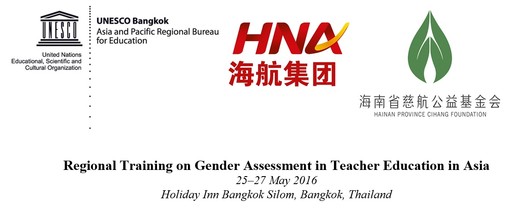Regional Training on Gender Assessment in Teacher Education in Asia, 25–27 May 2016, Bangkok, Thailand
Background
Gender equality remains at the heart of development in all sectors. The Sustainable Development Goals have a specific goal on gender to promote gender equality and empower all women and girls. The education related SDG also direct one of its targets to eliminate gender disparities in education and ensure equal access to all levels of education and vocational training for the vulnerable, including persons with disabilities, indigenous peoples and children in vulnerable situations by 2030 (target 4.5).
The Dakar Framework for Action highlights the need for learning content and materials to encourage and support gender equality and inclusion. Therefore, gender-responsive curricula have great potential to build knowledge and skills that support learners to examine dominant power structures, question gender stereotypes, promote positive gender relations, and advance towards gender equality (Miske, S. J. 2013. Exploring the gendered dimensions of teaching and learning. Background paper for EFA Global Monitoring Report 2013/14). The 2015 Education for All Global Monitoring Report found, however, that gender bias in textbooks remains pervasive in many countries. This bias can affect children’s self-esteem, lower their engagement in schools and limit their expectations about their future opportunities, including career options (Esplen, E. 2009. Gender and Care: Overview Report. Falmer, UK, Institute of Development Studies, University of Sussex).
Nonetheless, a coherent approach to gender mainstreaming is needed where all components and processes of the education sector mutually support gender equality goals. For gender equality to be a ‘lived’ reality in classrooms, teachers themselves must be gender sensitive and practice gender-responsive teaching. To do so, teachers must be provided with appropriate gender-sensitive education and training, both pre- and in-service, so that they can play a critical role in eliminating all forms of gender-related discriminations in and beyond the classrooms.
In 2015, UNESCO Bangkok launched an initiative to promote gender equality in the Asia-Pacific region, under the China/HNA Funds-in-Trust cooperation scheme. This ongoing five-year project “Enhancing Girl’s and Women’s Right to Quality Education through Gender Sensitive Policy Making, Teacher Development and Pedagogy”, targets five countries, namely Cambodia, Myanmar, Nepal, Sri Lanka and Uzbekistan. Recognizing the limited experience in conducting a sector-wide gender assessment in teacher education in this region, UNESCO Bangkok will support the gender assessment of teacher education in both content and perception in the participating countries. As part of the project, a regional experts meeting was organized in November 2015 to take stock of gender issues in teacher education in the participating countries, and of the scope of gender assessment in pre-service and in-service teacher education.
As a follow-up to the first step, UNESCO Bangkok will continue supporting the capacity development of national participants from the five participating countries in undertaking gender assessments. The assessment will focus on identifying and redressing gaps and biases in teacher education policies and materials, as well as evaluating stakeholder’s perceptions, attitudes, beliefs and stereotypes.
Objectives
The objectives of this regional training are to:
- Train the participants from the five participating countries in conducting gender assessment in teacher education at the country level;
- Review the draft gender assessment framework and instruments;
- Revise and finalize action plans for taking forward the gender assessment at the country level, including the overall scope of work, methodology, timelines, persons responsible and budget breakdown.
Expected outputs and outcomes
Outcomes and outputs expected of the training include:
- 25 country participants trained in conducting gender assessment in teacher education at the country level;
- Constructive comments collected for improving and finalizing the draft gender assessment framework and instruments;
- Final country action plans of the five participating countries developed to conduct gender assessments in teacher education.
Dates and Venue: 25-27 May 2016 | Holiday Inn Bangkok Silom, in Bangkok, Thailand
Participants
The training will bring together approximately 35-40 participants, mainly from the five participating countries participating. From each country, at least two participants should be researchers who could coordinate and/or undertake the gender assessment in teacher education at the country level following the training. Other participants should be teacher educator(s) in teacher education institutions and/or relevant official(s) from the Ministry of Education, who could eventually be part of a country team to lead the planning and implementation of the project activities at the country level. It is requested that all country participants should have at least a basic level of understanding of gender concepts and awareness on gender issues in education. Country participants will be joined by UNESCO staff from the respective Field Offices.
Experts and resource persons will also be invited to contribute to the technical sessions, and share information and experiences related to gender assessment initiatives.
All expenses (roundtrip economy airfare, accommodation at Holiday Inn Bangkok Silom and meals for the duration of the training) of the participants will be covered by UNESCO Bangkok.
Resources
- Concept Note (PDF, 81kb)
- Programme Agenda (PDF, 107kb)
Presentations
Session 1: Conceptual Framework on Gender Assessment of Teacher Education Systems in Asia
Gender Assessment of Teacher Education: Conceptual Framework (Min Bista, Consultant, UNESCO Bangkok) - pdf, 821kb
Session 2: Gender Assessment in Teaching and Learning Materials
Session 3: Group Work on Gender Assessment of Teaching and Learning Materials Facilitated by Min Bista
Other Resourse(s):
- Assessing Curriculum (Gender) [Huma Masood, National Programme Officer (Gender & Education), UNESCO New Delhi] - pdf, 1.7mb












